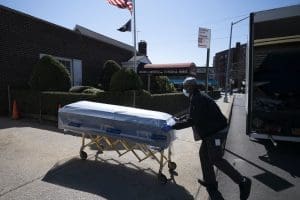2020 was deadliest year in US history — and life expectancy is dropping
Black Americans and Latinos suffered the biggest impact.

Life expectancy in the United States dropped a staggering one year during the first half of 2020 as the coronavirus pandemic caused its first wave of deaths, health officials are reporting.
Minorities suffered the biggest impact, with Black Americans losing nearly three years and Hispanics nearly two years, according to preliminary estimates Thursday from the Centers for Disease Control and Prevention.
“This is a huge decline,” said Robert Anderson, who oversees the numbers for the CDC. “You have to go back to World War II, the 1940s, to find a decline like this.”
Other health experts say it shows the profound impact of COVID-19, not just on deaths directly due to infection but also from heart disease, cancer, and other conditions.
“What is really quite striking in these numbers is that they only reflect the first half of the year … I would expect that these numbers would only get worse,” said Dr. Kirsten Bibbins-Domingo, a health equity researcher and dean at the University of California, San Francisco.
This is the first time the CDC has reported on life expectancy from early, partial records; more death certificates from that period may yet come in. It’s already known that 2020 was the deadliest year in U.S. history, with deaths topping 3 million for the first time.
Life expectancy is how long a baby born today can expect to live, on average. In the first half of last year, that was 77.8 years for Americans overall, down one year from 78.8 in 2019. For males it was 75.1 years and for females 80.5 years.
As a group, Hispanics in the U.S. have had the most longevity and still do. Black people now lag white people by six years in life expectancy, reversing a trend that had been bringing their numbers closer since 1993.
Between 2019 and the first half of 2020, life expectancy decreased 2.7 years for Black people, to 72. It dropped 1.9 years for Hispanics, to 79.9, and 0.8 years for white people, to 78. The preliminary report did not analyze trends for Asian or Native Americans.
“Black and Hispanic communities throughout the United States have borne the brunt of this pandemic,” Bibbins-Domingo said.
They’re more likely to be in frontline, low-wage jobs and living in crowded environments where it’s easier for the virus to spread, and “there are stark, pre-existing health disparities in other conditions” that raise their risk of dying of COVID-19, she said.
More needs to be done to distribute vaccines equitably, to improve working conditions and better protect minorities from infection, and to include them in economic relief measures, she said.
Dr. Otis Brawley, a cancer specialist and public health professor at Johns Hopkins University, agreed.
“The focus really needs to be broad spread of getting every American adequate care. And health care needs to be defined as prevention as well as treatment,” he said.
Overall, the drop in life expectancy is more evidence of “our mishandling of the pandemic,” Brawley said.
“We have been devastated by the coronavirus more so than any other country. We are 4% of the world’s population, more than 20% of the world’s coronavirus deaths,” he said.
Not enough use of masks, early reliance on drugs such as hydroxychloroquine, “which turned out to be worthless,” and other missteps meant many Americans died needlessly, Brawley said.
“Going forward, we need to practice the very basics” such as hand-washing, physical distancing, and vaccinating as soon as possible to get prevention back on track, he said.
Recommended

Ohio doctors fear effects of emergency abortion care case set to go before U.S. Supreme Court
A federal law that allows emergency departments to treat patients without regard to their ability to pay will be under U.S. Supreme Court scrutiny this week, and Ohio doctors are concerned about the case’s local impact on emergency abortion care.
By Susan Tebben, Ohio Capital Journal - April 23, 2024
House GOP votes to end flu, whooping cough vaccine rules for foster and adoptive families
A bill to eliminate flu and whooping cough vaccine requirements for adoptive and foster families caring for babies and medically fragile kids is heading to the governor’s desk.
By Anita Wadhwani, Tennessee Lookout - March 26, 2024
U.S. House Speaker Johnson says IVF should be protected — just not by Congress
U.S. House Speaker Mike Johnson said Thursday that it’s up to states and not Congress to preserve access to in vitro fertilization, weighing in on a growing national debate and campaign issue.
By Jennifer Shutt, States Newsroom - March 14, 2024









































































